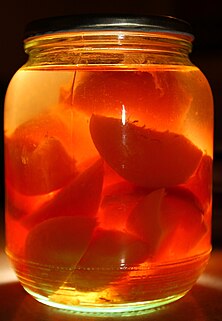You can help expand this article with text translated from the corresponding article in French. (March 2023) Click for important translation instructions.
|
| This article may have misleading content. Please help clarify the content. (September 2023) |
 Traditional Bulgarian kompot Traditional Bulgarian kompot | |
| Alternative names | Compot or uzvar |
|---|---|
| Type | Preserved food or drink |
| Course | Dinner or celebration |
| Place of origin | Europe |
| Region or state | Primarily Central, Eastern, Southern, and the Balkans |
| Serving temperature | Hot, cold, or at room temperature |
| Main ingredients | Various fruits |
Kompot or compot, as prepared in Central and Eastern Europe and West Asia, refers to boiled fruits (typically fresh or dried) served either as a drink or a dessert depending on the region. When served as a dessert, it is essentially identical to the French compote, which is where the term "kompot" originates from. When served as a drink, it is also known as vzvar (взвар) or uzvar (узвар), from a Slavic root word meaning "to boil".
As a drink, kompot is a sweet, non-alcoholic beverage that may be served hot or cold, depending on tradition and season. It is created by cooking fruit such as strawberries, apricots, peaches, apples, raspberries, rhubarb, plums, or sour cherries in a large volume of water, often together with sugar, honey, or raisins as additional sweeteners. Sometimes different spices, such as vanilla or cinnamon, are added for additional flavour, especially in the winter, when kompot is usually served hot. Kompot is popular in Central and Eastern European countries, as well as in Southern Europe.
Kompot is part of the cuisine of many countries in Central, Eastern, and Southern Europe, as well as in the Middle East and West Asia. It is known by a variety of names in these countries, such as компот (kompot) in Russian, Ukrainian and Bulgarian, kompót in Slovak and Hungarian, kompotas in Lithuanian, κομπόστα (kompósta) in Greek, and komposto in Turkish. Making kompot was a common way of preserving fruit for the winter in Southern and Eastern European countries; in 1885, Lucyna Ćwierczakiewiczowa wrote in a recipe book that kompot "preserved fruit so well it seemed fresh". Kompot is also popular in many Central Asian countries, such as Uzbekistan and Kyrgyzstan.
In the colder parts of Europe, instead of stewing the fruits and then preserving the result, the fruits are dried and then rehydrated to make kompot. This method is notably used in the twelve-dish Christmas Eve supper prepared in the former Polish-Lithuanian Commonwealth.
The consumption of kompot has been declining since the 1980s. With the end of food preservation in many Southern and Eastern European countries, kompot has been supplanted by fruit juice, soft drinks and mineral water.
See also
References
- https://arpacbahsismtal.meb.k12.tr/meb_iys_dosyalar/33/05/974043/dosyalar/2017_10/19221440_tYrk_mutfaYnda_komposto_ve_hoYaflar_07.pdf Archived 2021-11-28 at the Wayback Machine
- "Dünya mutfağında komposto" (in Turkish). 4 July 2005. Archived from the original on 29 October 2021. Retrieved 29 October 2021.
- "Turkish Food & Recipes".
- Lucyna Ćwierczakiewiczowa, Jedyne praktyczne przepisy konfitur, różnych marynat, wędlin, wódek, likierów, win owocowych, miodów oraz ciast
- Berger, Stanisław (2005). Kuchnia Polska (in Polish) (XLVII ed.). Warszawa: Państwowe Wydawnictwo Ekonomiczne, then rebranded into Polskie Wydawnictwo Ekonomiczne. ISBN 83-208-1556-8. Archived from the original on 2018-11-06. Retrieved 2016-02-17.
- Viviane Bourdon, Savoureuse Pologne, 160 recettes culinaires et leur histoire, Paris, La Librairie polonaise, les éditions Noir sur Blanc, 2006
External links
- Apple-cranberry kompot recipe
- Dried fruit kompot (uzvar) recipe
- Cherry kompot recipe at About.com Archived 2015-09-23 at the Wayback Machine
This dessert-related article is a stub. You can help Misplaced Pages by expanding it. |
This drink-related article is a stub. You can help Misplaced Pages by expanding it. |